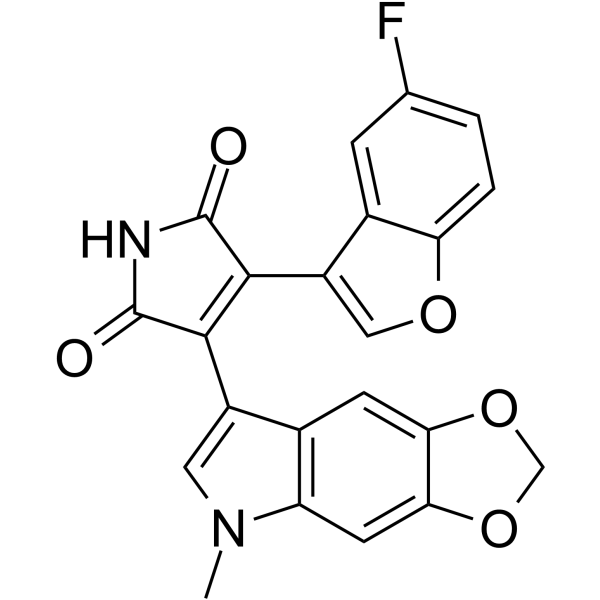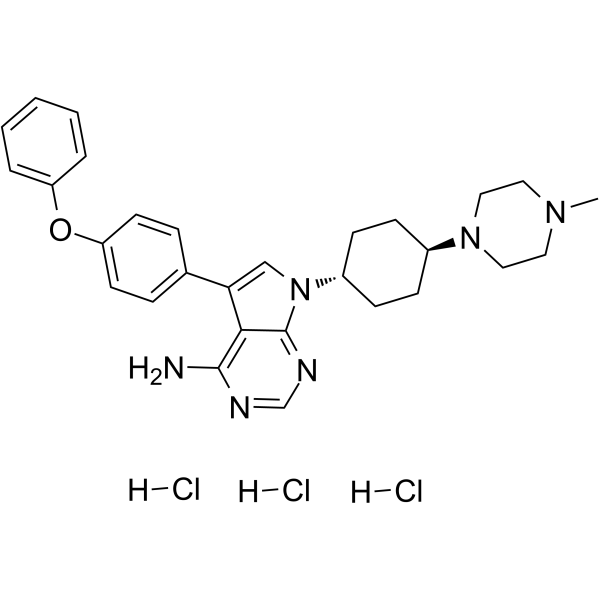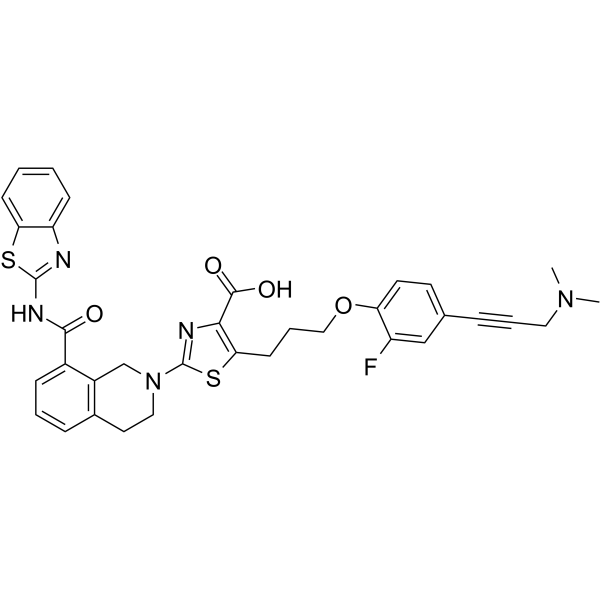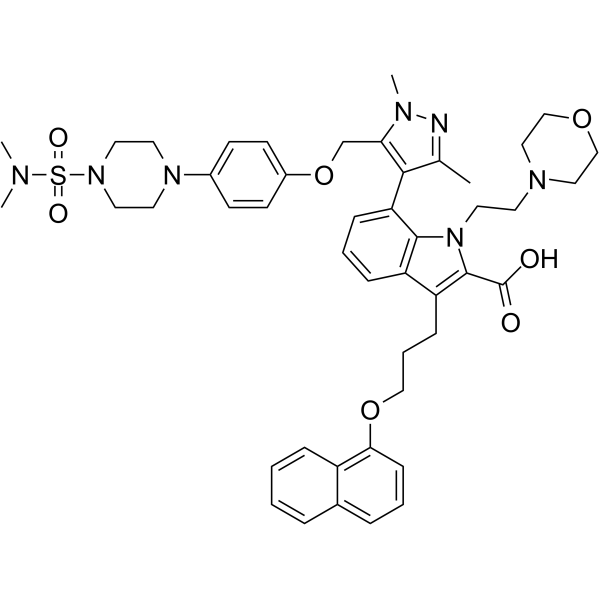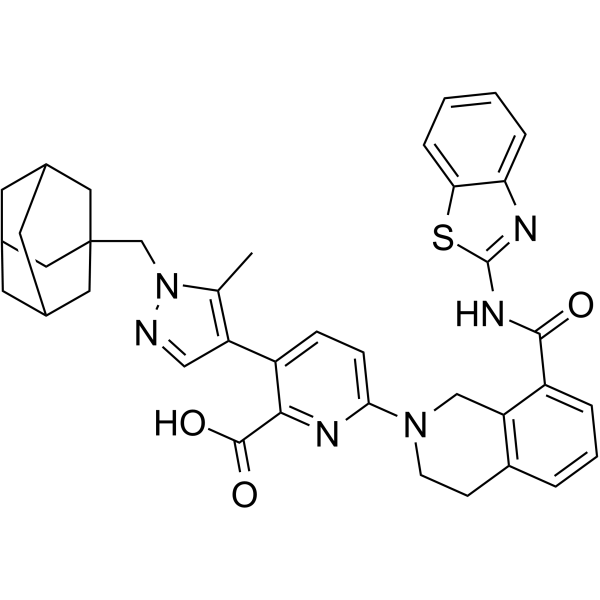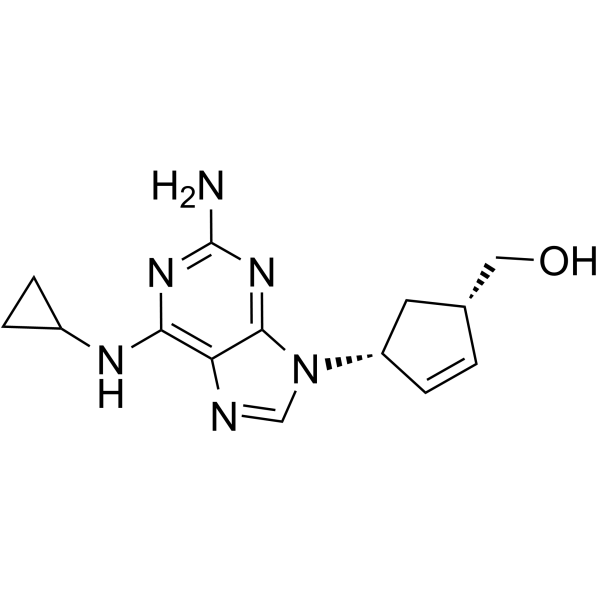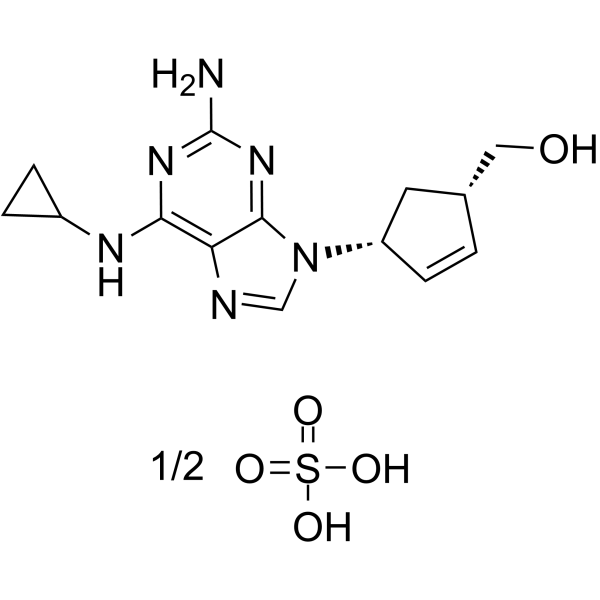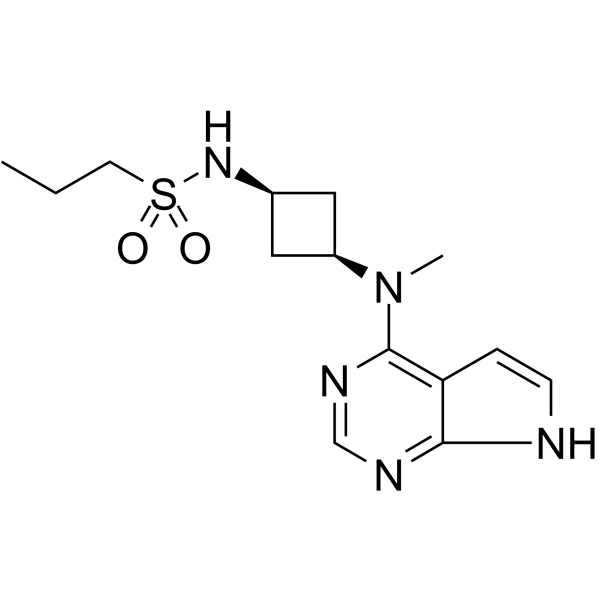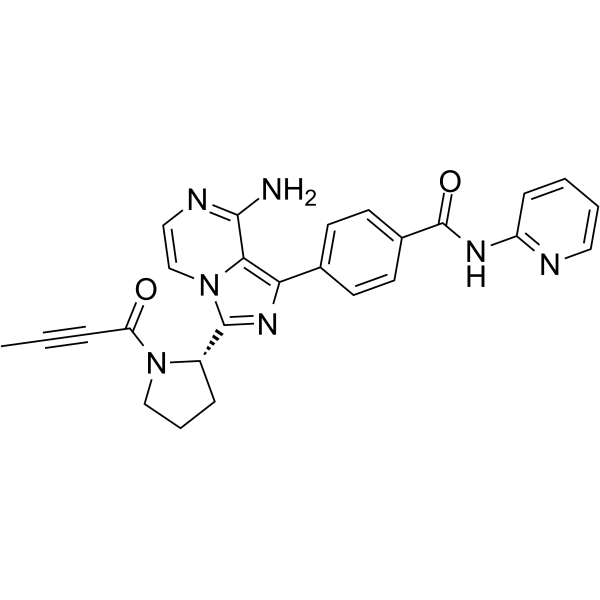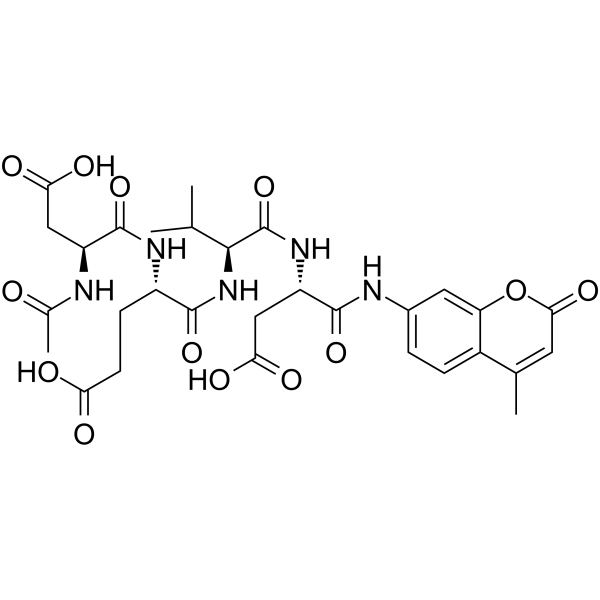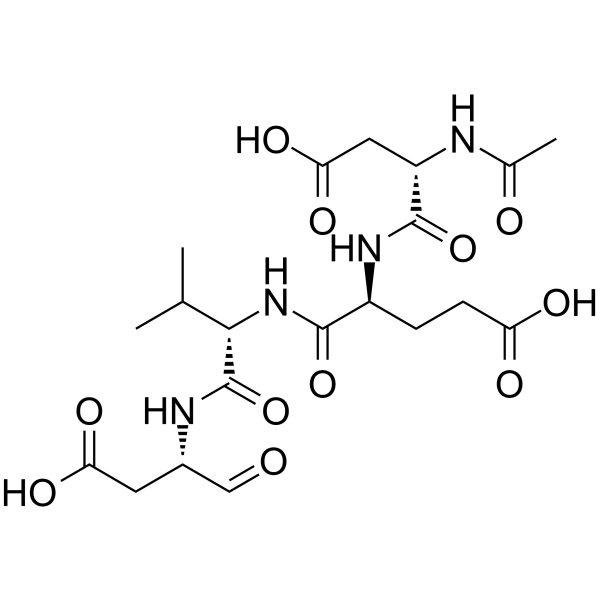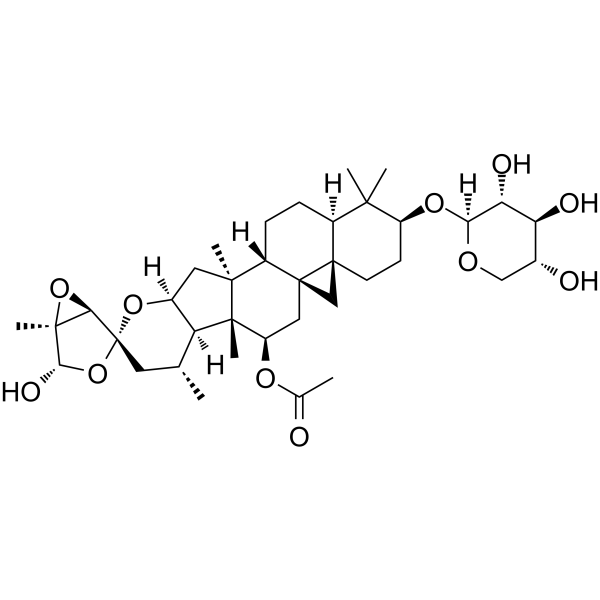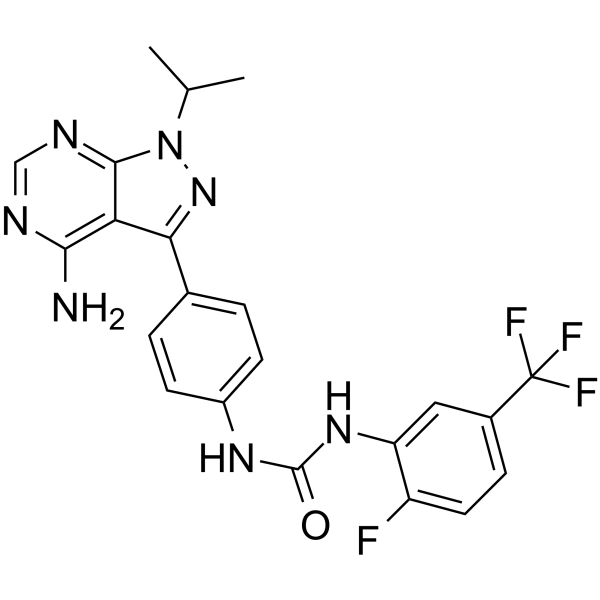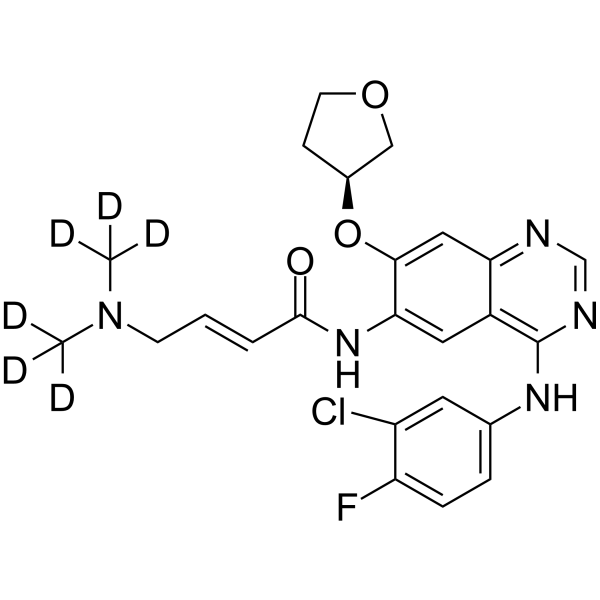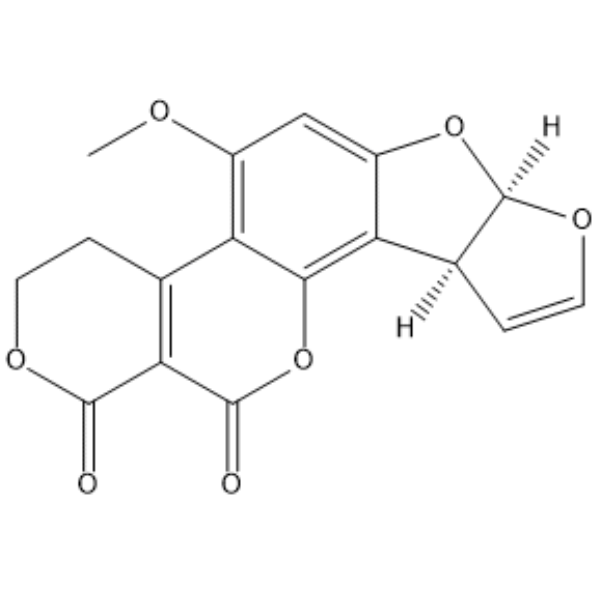|
BP10604
|
7,8-Didehydrocimigenol
|
|
|
|
|
7,8-Didehydrocimigenol can be used for the treatment of cardiovascular disorders such as atherosclerosis. It upregulates PPAR-γ in EC inhibits NF-kB activity of TNF-α-activated EC which leads to selective inhibition of VCAM-1 expression.
|
|
BP10645
|
7alpha,15-Dihydroxydehydroabietic acid
|
|
|
|
|
7alpha,15-Dihydroxydehydroabietic acid may exhibit significant cytotoxic activity.
|
|
BP10462
|
8alpha-Hydroxyhirsutinolide
|
|
|
|
|
8alpha-Hydroxyhirsutinolide shows anti-inflammatory activity, it inhibits TNF-α-induced NF-κB activity with the IC(50) value of 1.9 uM.
|
|
BP10501
|
9-dihydro-13-acetylbaccatin III
|
|
|
|
|
9-Dihydro-13-acetylbaccatin III is an apoptosis inducer. It shows cytotoxicity against the MCF7 cell line and drug-resistant cell line MCF7-ADR.
|
|
BP10057
|
9-ING-41
|
|
|
|
|
9-ING-41 is a glycogen synthase kinase-3 inhibitor.
|
|
BP10721
|
9-O-Feruloyl-5,5'-dimethoxylariciresinol
|
|
|
|
|
(+)-9'-O-trans-feruloyl-5,5'-dimethoxylariciresinol may have anti-allergic inflammatory effect, it can inhibit release of histamine from mast cells. It shows cytotoxicity against a small panel of human tumor cell lines, with ED50 values of 9.86 to approximately 12.68 microg/ml.
|
|
BP10536
|
A 419259 trihydrochloride
|
|
|
|
|
A 419259 trihydrochloride is an Src family kinases inhibitor (IC50s: 9 nM, 3 nM and 3 nM for Src, Lck and Lyn).
|
|
BP10280
|
A-1155463
|
|
|
|
|
A-1155463, a highly potent and selective BCL-XL inhibitor, shows picomolar binding affinity to BCL-XL, and >1000-fold weaker binding to BCL-2 and related proteins BCL-W(Ki=19 nM) and MCL-1(Ki>440 nM).
|
|
BP10723
|
A-1210477
|
|
|
|
|
A-1210477 is an effective and specific MCL-1 and Bcl-2 inhibitor (Ki/IC50: 0.454/26.2 nM).
|
|
BP10527
|
A-1331852
|
|
|
|
|
A-1331852 is a potent and selectiveBCL-XL inhibitor and may be useful in the treatment of cancer, immune and autoimmune diseases.
|
|
BP10422
|
Abacavir
|
|
|
|
|
Abacavir is a nucleoside reverse transcriptase inhibitor analog of guanosine. This agent decreases HIV viral loads, retards or prevents the damage to the immune system, and reduces the risk of developing AIDS.
|
|
BP10857
|
Abacavir sulfate
|
|
|
|
|
Abacavir, a nucleoside analogue, effectively utilize its antiviral activity
|
|
BP10688
|
Abrocitinib
|
|
|
|
|
Abrocitinib (PF-04965842) is a potent, specific and orally-active JAK1 inhibitor (IC50s: 29/803 nM for JAK1/2).
|
|
BP10491
|
Acalabrutinib
|
|
|
|
|
Acalabrutinib, also known as ACP-196, is an orally available inhibitor of Bruton's tyrosine kinase (BTK) with potential antineoplastic activity. Upon administration, ACP-196 inhibits the activity of BTK and prevents the activation of the B-cell antigen receptor (BCR) signaling pathway. This prevents both B-cell activation and BTK-mediated activation of downstream survival pathways. This leads to an inhibition of the growth of malignant B cells that overexpress BTK. BTK, a member of the src-related BTK/Tec family of cytoplasmic tyrosine kinases, is overexpressed in B-cell malignancies; it plays an important role in B lymphocyte development, activation, signaling, proliferation and survival.
|
|
BP10739
|
Ac-DEVD-AMC
|
|
|
|
|
Ac-DEVD-AMC is the substrate of Caspase-3 .
|
|
BP10738
|
Ac-DEVD-CHO
|
|
|
|
|
Ac-DEVD-CHO is a selective Caspase-3 inhibitor (Ki: 230 pM).
|
|
BP10845
|
Actein
|
|
|
|
|
Actein has a stimulatory effect on osteoblastic bone formation or has potential activity against osteoporosis, it also can prevent oxidative damage to osteoblasts in osteoporotic patients. Actein's ability to pathways involved in lipid disorders and carcinogenesis may make it a new agent for preventing and treating these major disorders, it has been shown to inhibit the proliferation of human breast cancer cells, by altering the activity of the ER IP3 receptor and Na,K-ATPase, inducing calcium release and modulating the NF-kB and MEK pathways.
|
|
BP10449
|
AD80
|
|
|
|
|
AD80, a multikinase inhibitor, inhibits RET, RAF, SRCand S6K, with greatly reduced mTOR activity.
|
|
BP10365
|
Afatinib D6
|
|
|
|
|
Afatinib D6 (BIBW 2992 D6) is a deuterium-labeled Afatinib. Afatinib is an irreversible EGFR family inhibitor.
|
|
BP10184
|
Aflatoxin G1
|
|
|
|
|
Aflatoxin G1 (AFG1 ), a member of the AF family with cytotoxic and carcinogenic properties, could cause DNA damage in alveolar type II (AT-II) cells and induce lung adenocarcinoma.
|




